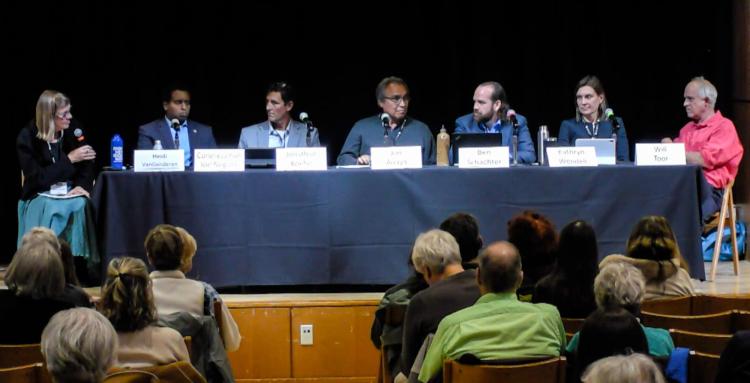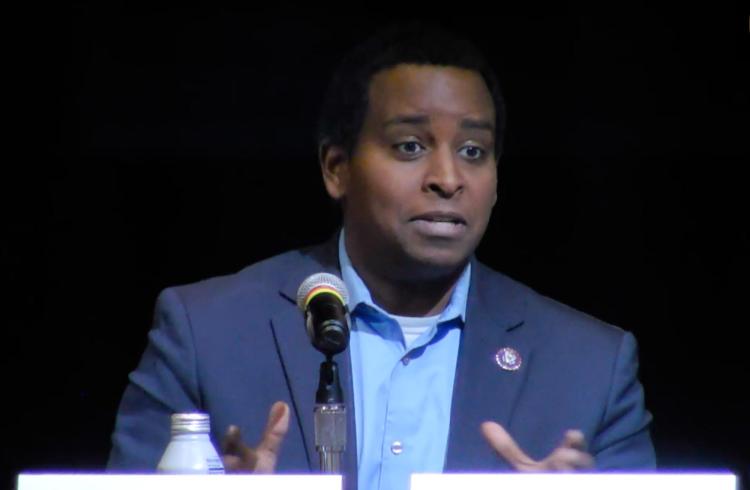Panel explores human rights impacts of climate change, ways to collectively move forward
A Conference on World Affairs panel April 14 on a rights-based approach to addressing climate change vacillated between optimism at momentum around potential solutions and the grim truth that emissions keep rising and the Earth—and all of humanity—face dire consequences.
The panel, titled Enacting Climate Solutions Through Human Rights Climate Commitments: Right Here, Right Now Boulder Impact Forum, included representatives at each level of governance: the United Nations, the U.S. government, the state of Colorado, the city of Boulder and CU Boulder.

Enacting Climate Solutions Through Human Rights Climate Commitments panelists

U.S. Rep. Joe Neguse
Panelist Benjamin Schachter, team leader for Climate and the Environment at United Nations Human Rights, kept the discussion focused on hard climate change truths.
“Here we are, 30 years after the international community agreed to stop climate change, with emissions rising every year,” Schachter said. “We’ve got to stop it. People can stop it. Lawsuits work. People exercising their speech and freedom of expression works. People coming together and exercising choice work. But we need to activate and empower people.”
Schachter was a key representative for UN Human Rights as the organization co-hosted the inaugural Right Here, Right Now Global Climate Summit with CU Boulder on campus in December. One major outcome of the summit will be the Right Here, Right Now Human Rights Climate Commitments, a set of assurances that states, subnational governments, corporations and universities will be encouraged to make to address the climate crisis while keeping human rights as a central focus. The commitments are expected to be formally released at the 2023 United Nations Climate Change Conference or Conference of the Parties of the UNFCCC, more commonly referred to as COP28, in Dubai later this year.
Panelist and U.S. Rep. Joe Neguse, a former CU regent and CU Boulder alumnus representing the interests of a state, struck a decidedly more optimistic tone by celebrating passage of the Inflation Reduction Act (IRA), which he described as, at its core, “a climate bill” that includes historically significant investments in the fight against climate change in the U.S. Neguse also acknowledged it took compromise to get it across the finish line.
“If you begin to peel back various investments in the bill, you will find quickly it is going to have an impact on our climate for generations to come,” Neguse said.
Neguse said most empirical studies show the bill, when fully implemented, will reduce emissions below 2005 levels (a reduction of 31% to 41% in harmful greenhouse gas emissions). While that still isn’t enough to curb the harmful impacts of climate change, the process of addressing the issue is iterative and there will be opportunities “to build on what we did in this bill,” Neguse said.
“I view this in a much less fatalistic way,” said Neguse, who generated applause when he told the audience of the upcoming birth of his second child. “To the extent I am deeply invested in my children’s future, I have to believe this is a problem we can solve collectively together if we apply an appropriate sense of urgency and boldness.”
Panelist Will Toor, executive director of the Colorado Energy Office, said he has never been more optimistic about addressing climate change in his long history of working on environmental issues.
“Colorado is one of the most exciting states in the country when it comes to clean energy policy,” Toor said.
Learn more about the inaugural Right Here, Right Now Global Climate Summit
Toor also said the conversation at the national level is changing—in a good way. Incentivize people to invest in electric vehicles and they will do it. Focus on “making clean energy cheap” and they will buy it. Toor noted that red and blue states are already starting to benefit from IRA investments.
“These are bread-and-butter issues in congressional districts around the country…that have the potential to transform the politics of climate change,” Toor said.
Director of the city’s Climate Initiatives Office Jonathan Koehn also expressed optimism and noted the work of local government is strengthened through support from state and federal partners. Koehn also noted that “emissions reduction alone is not sufficient in addressing the climate emergency.” Climate justice and climate resilience are also key priorities, he said, citing other climate change-related challenges, including the loss of biodiversity, a lack of recognition of the sacredness of land and social and economic inequality.
Panelist Kathryn Wendell, executive director of the Center for Ethics and Social Responsibility (CESR) at the Leeds School of Business, said she was inspired that so many businesses are taking on climate change and building it into their bottom lines. When the U.S. pulled out of the Paris Climate Agreement, business stepped in.
“There is now a strong business and strong economic case for taking climate action,” Wendell said. “Climate risk is financial risk.”
CU Distinguished Professor S. James Anaya, steering committee chair of the Right Here, Right Now Global Climate Summit and former UN special rapporteur on the rights of Indigenous peoples, said educational institutions—including CU Boulder—have a vital role to play.
“Not only is incredible research happening here, but it is a place to motivate young people to take action. But the university must take action, too, to further curb emissions and meet its sustainability goals,” Anaya said.
The panel was moderated by CU Boulder Chief Sustainability Officer Heidi VanGenderen, a steering committee co-lead of the Right Here, Right Now Global Climate Summit.


